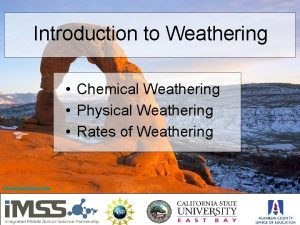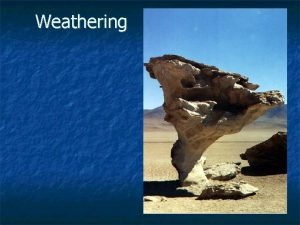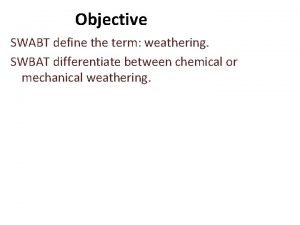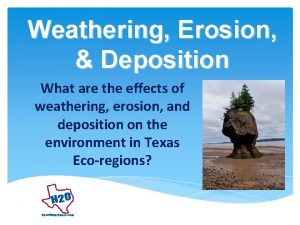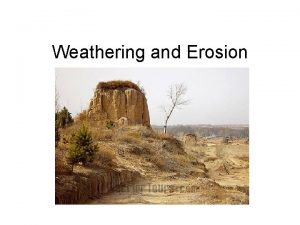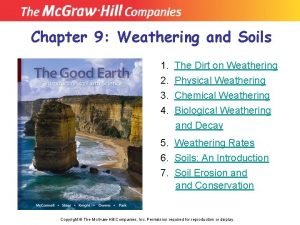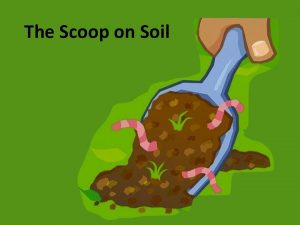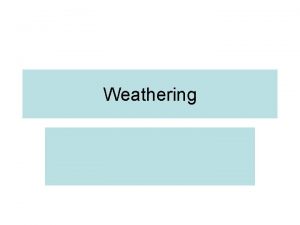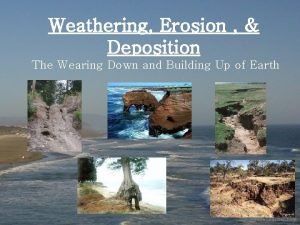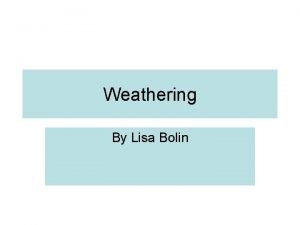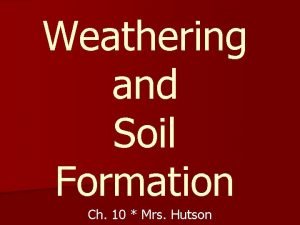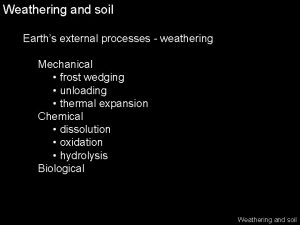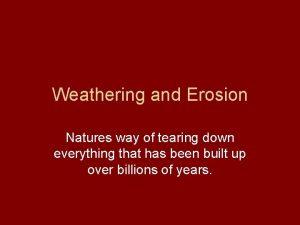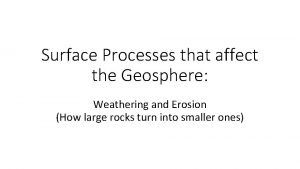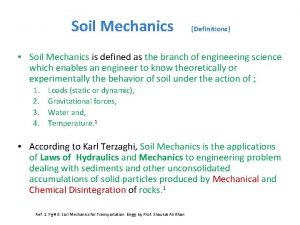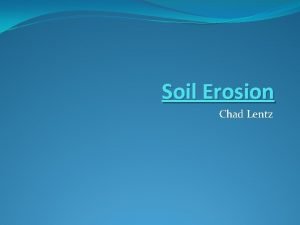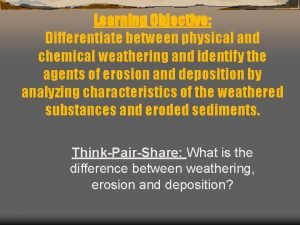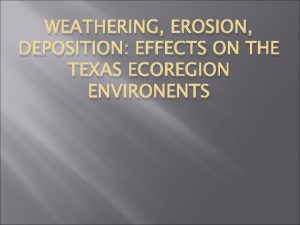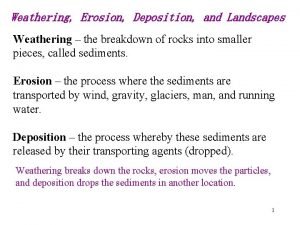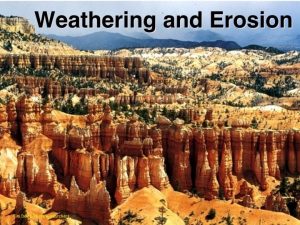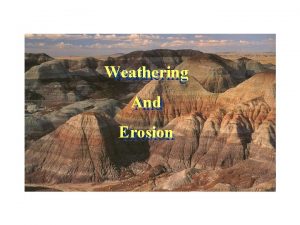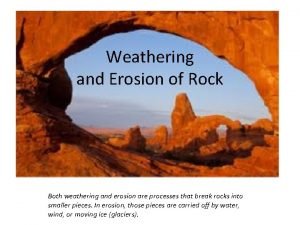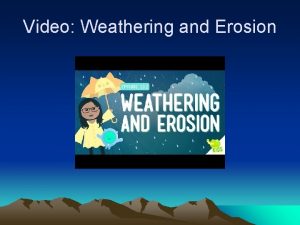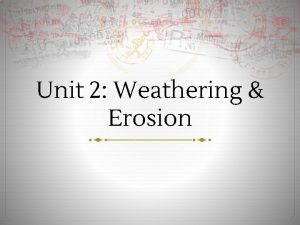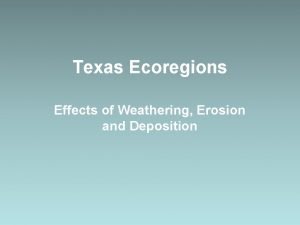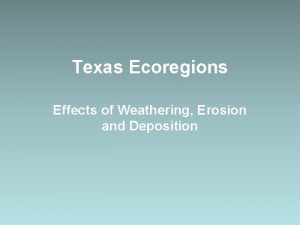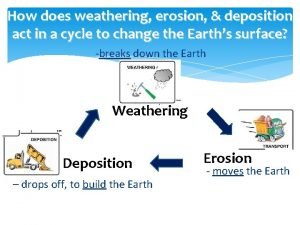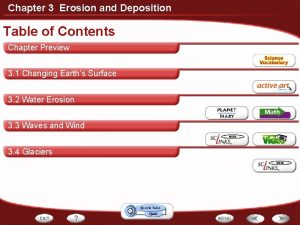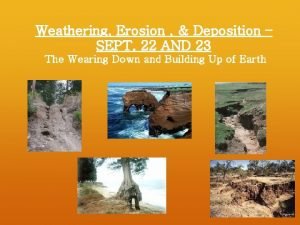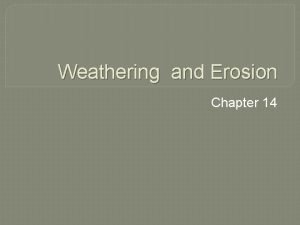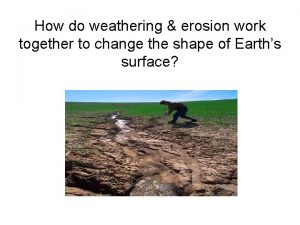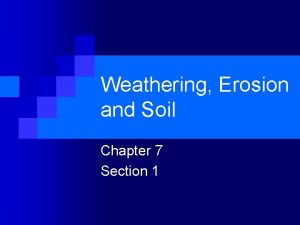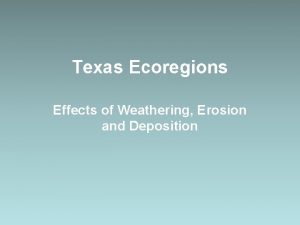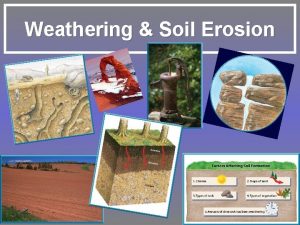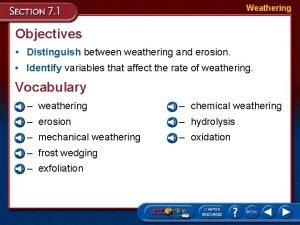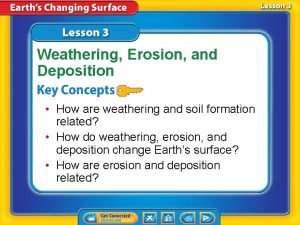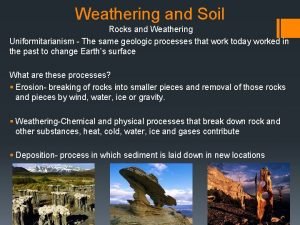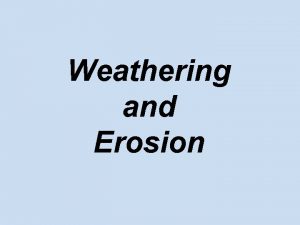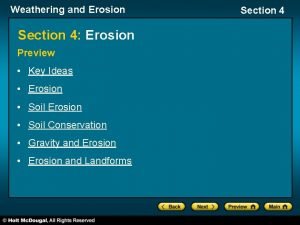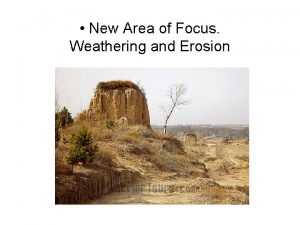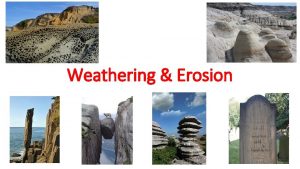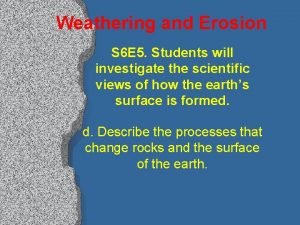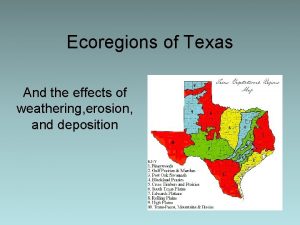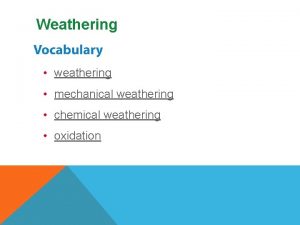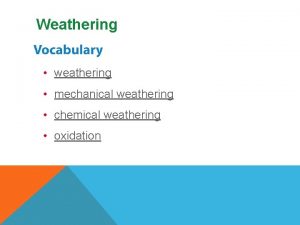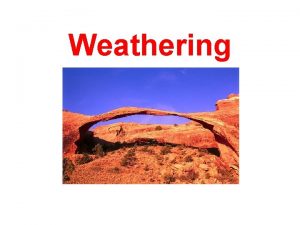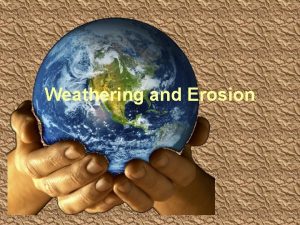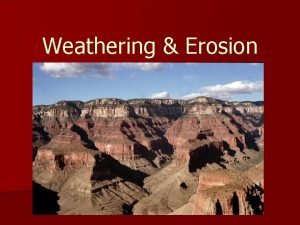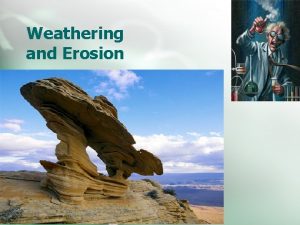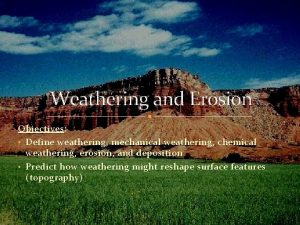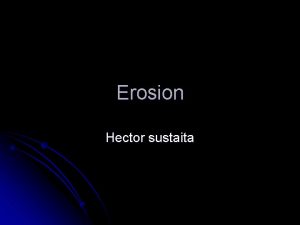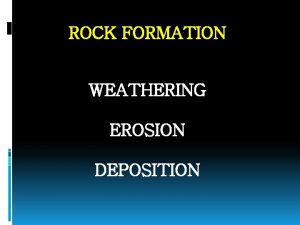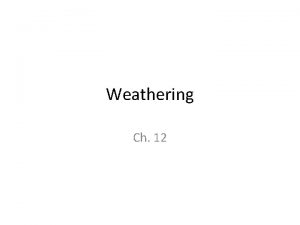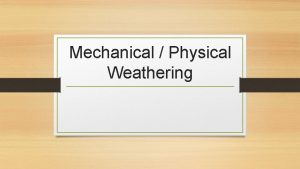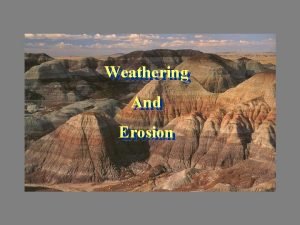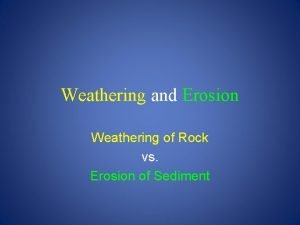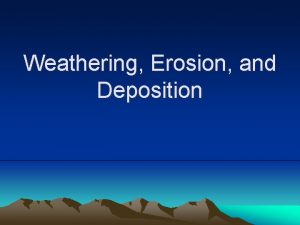Weathering Erosion Differential Weathering Chemical Weathering Mechanical Physical





















































- Slides: 53

Weathering & Erosion Differential Weathering Chemical Weathering Mechanical (Physical) Weathering Etc Vocabulary True or False Q $100 Q $100 Q $200 Q $200 Q $300 Q $300 Q $400 Q $400 Q $500 Q $500 Final Jeopardy

$100 Question from H 1 the average weather conditions in An area over a long period of time

$100 Answer from H 1 Climate (Temperature)

$200 Question from H 1 The height (typically measured in feet above sea level) to which something is elevated or to which it rises

$200 Answer from H 1 Elevation

$300 Question from H 1 The more _______ of a rock that is exposed to weathering, the faster the rock will wear down.

$300 Answer from H 1 Surface Area

$400 Question from H 1 Rocks that are made of ______ minerals will weather faster than rocks that are made of _______ minerals.

$400 Answer from H 1 Softer, harder

$500 Question from H 1 A process by which softer, lessweather resistant rock wear away and leave harder, more weatherresistant rock is called…

$500 Answer from H 1 Differential Weathering

$100 Question from H 2 Rain, snow or sleet that contains a high concentration of acids (an agent of chemical weathering)

$100 Answer from H 2 Acid Precipitation

$200 Question from H 2 These are agents of chemical weathering (name three)

$200 Answer from H 2 Water, weak acids/plant Acids, air

$300 Question from H 2 What causes acid precipitation

$300 Answer from H 2 The burning of fossil fuels

$400 Question from H 2 a chemical reaction in which an element, such as iron, combines with oxygen to form an oxide. This form of chemical weathering forms rust.

$400 Answer from H 2 Oxidation

$500 Question from H 2 Another name for living things such as algae or fungus (which live on rocks) which produce acids that slowly break down rock.

$500 Answer from H 2 Lichens

$100 Question from H 3 The grinding and wearing away of rock surfaces through the mechanical actions of other rocks or sand particles

$100 Answer from H 3 Abrasion

$200 Question from H 3 These are agents of Mechanical (Physical) Weathering (list at least 4)

$200 Answer from H 3 ice, wind, water, gravity, plants and animals

$300 Question from H 3 An agent of mechanical weathering that causes rocks to fall (rock slide/landslide) causing abrasion as they hit each other

$300 Answer from H 3 Gravity

$400 Question from H 3 When water seeps into cracks during warm weather, temperatures drop, water freezes and expands pushing against the sides of the crack (pressure), widening the crack until the rock breaks up/apart

$400 Answer from H 3 Ice Wedging

$500 Question from H 3 Describes how a rock changes after it has been in a riverbed for a long time

$500 Answer from H 3 the edges of the rock are worn away and its surface becomes smoother

$100 Question from H 4 The process by which wind, water, ice or gravity transports soil and sediment from one location to another

$100 Answer from H 4 Erosion

$200 Question from H 4 The process in which material/minerals are laid down after being carried away

$200 Answer from H 4 Deposition

$300 Question from H 4 The process by which rock materials are broken down by the action of physical or chemical processes

$300 Answer from H 4 Weathering

$400 Question from H 4 What agent of weathering can weather rock mechanically and chemically?

$400 Answer from H 4 Water

$500 Question from H 4 Name four factors that affect how fast weathering happens

$500 Answer from H 4 Temperature, moisture, Elevation and slope

$100 Question from H 5 The roots of plants can Grow deep into cracks and cause Mechanical weathering

$100 Answer from H 5 True

$200 Question from H 5 Elevation and slope can affect How fast weathering occurs

$200 Answer from H 5 True

$300 Question from H 5 Rocks with very little surface area weather faster than rocks With a lot of surface area

$300 Answer from H 5 False

$400 Question from H 5 Temperature is a major factor In both chemical and mechanical weathering

$400 Answer from H 5 True

$500 Question from H 5 In chemical weathering, the chemical composition of A rock does NOT change.

$500 Answer from H 5 False

Final Jeopardy Briefly, how are caves/caverns formed underground?

Final Jeopardy Answer Acid precipitation seeps into ground and dissolves Limestone
 Example of chemical weathering
Example of chemical weathering Chemical weathering
Chemical weathering Types of weathering of rocks
Types of weathering of rocks Weathering erosion
Weathering erosion Mechanical and chemical weathering venn diagram
Mechanical and chemical weathering venn diagram Mechanical and chemical weathering venn diagram
Mechanical and chemical weathering venn diagram Mechanical and chemical weathering
Mechanical and chemical weathering Compare and contrast mechanical and chemical weathering
Compare and contrast mechanical and chemical weathering Chemical and mechanical digestion venn diagram
Chemical and mechanical digestion venn diagram Dissolve
Dissolve Compare and contrast mechanical and chemical weathering
Compare and contrast mechanical and chemical weathering Example of mechanical weathering
Example of mechanical weathering Venn diagram of chemical and mechanical weathering
Venn diagram of chemical and mechanical weathering Mechanical and chemical weathering venn diagram
Mechanical and chemical weathering venn diagram Venn diagram of mechanical and chemical weathering
Venn diagram of mechanical and chemical weathering Mechanical and chemical weathering
Mechanical and chemical weathering Mechanical weathering examples
Mechanical weathering examples Rill erosion
Rill erosion Mechanical weathering
Mechanical weathering Mechanical weathering
Mechanical weathering Difference between weathering and erosion
Difference between weathering and erosion How does weathering affect edwards plateau
How does weathering affect edwards plateau Weathering vs erosion vs deposition
Weathering vs erosion vs deposition The three types of weathering
The three types of weathering Weathering vs erosion
Weathering vs erosion What is wind blasting sand at rock and carving out arches
What is wind blasting sand at rock and carving out arches Bill nye
Bill nye Weathering and erosion video
Weathering and erosion video Weathering and erosion difference youtube video
Weathering and erosion difference youtube video Weathering and erosion questions
Weathering and erosion questions Post oak savannah weathering
Post oak savannah weathering South texas plains deposition
South texas plains deposition Agents of weathering
Agents of weathering Weathering worksheet pdf
Weathering worksheet pdf Weathering and erosion
Weathering and erosion Weathering erosion and deposition
Weathering erosion and deposition Weathering and erosion
Weathering and erosion Weathering and erosion study guide
Weathering and erosion study guide Chapter 14 weathering and erosion review answers
Chapter 14 weathering and erosion review answers What happens when weathering and erosion work together?
What happens when weathering and erosion work together? Weathering webquest
Weathering webquest Chapter 7 weathering erosion and soil
Chapter 7 weathering erosion and soil Weathering and erosion virtual field trip
Weathering and erosion virtual field trip Weathering erosion
Weathering erosion Soils in ____ contain little organic material and are thin.
Soils in ____ contain little organic material and are thin. Distinguish between weathering and erosion
Distinguish between weathering and erosion Weathering vs erosion
Weathering vs erosion Uniformitarianism examples
Uniformitarianism examples Weathering vs erosion
Weathering vs erosion Weathering and soil erosion
Weathering and soil erosion Weathering vs erosion
Weathering vs erosion Weathering and erosion
Weathering and erosion Feldspar hydrolysis
Feldspar hydrolysis Ecoregions of texas
Ecoregions of texas
